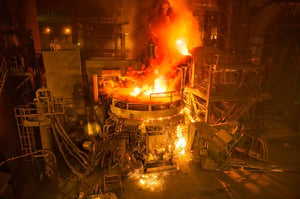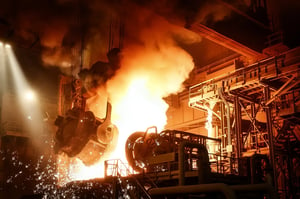
Achieving Operational
ACEROS GUATEMALA
AG Group is a distinguished Guatemalan company recognized for its leadership in transforming the manufacturing and distribution of steel products. With over seventy years of experience, it provides comprehensive solutions tailored to its customers' needs. Following an expansion, the company now operates in two countries, Guatemala and Honduras, and distributes its products to eleven countries across the region, including Guatemala, El Salvador, Honduras, Costa Rica, Nicaragua, Belize, Panama, Puerto Rico, the Dominican Republic, Mexico, and the United States.
In 2018, AG Group collaborated with London Consulting Group on the "Total91" Project, which focused on improving the operation’s profitability and productivity, optimizing installed capacity, and strengthening cost management and planning.

MANAGEMENT AND PLANNING CHALLENGES IN THE STEEL INDUSTRY
With the "Total91" project, AG Group aimed to improve profitability and operational efficiency. The main challenge was optimizing the steel mill’s and rolling mill’s utilization, controlling cost fluctuations, and improving the production floor’s planning and management processes.
- Take full advantage of the tools and processes, fully integrating the planning processes within the system.
- Reducing additional costs associated with importing steel billets to meet operational demand.
- Optimizing unit costs by increasing the steel mill’s production.
- Improving the efficiency and utilization of the rolling mills’ production lines, increasing production, and diluting fixed costs.
- Fostering a medium- and long-term planning culture, improving communication, and aligning objectives throughout the value chain using clear and structured information.
OPTIMIZING STEEL PRODUCTION THROUGH ADVANCED TECHNOLOGY AND RESOURCE MANAGEMENT
AG Group, together with London Consulting Group, established a series of key objectives focused on improving operational efficiency. This included optimizing the scrap supply in the patios, implementing advanced tools such as SAP to maximize productivity, and developing a maintenance management model to strengthen the main production processes.
- Organization and Governance Model (Role Charter).
- Management Information Systems (KPI's) and Management Model.
- Strengthening Processes and Parameters, Maximizing SAP Utilization.
- Effective management of scrap supply and patio operations.
- Developing the maintenance management model to increase the productivity of the main production processes.
- In conjunction with the AG Group personnel, the London Consulting Team followed up and provided continuity to the initiatives implemented during Phase I.
INNOVATION AND CONTINUOUS IMPROVEMENT AT EVERY STAGE OF PRODUCTION
London Consulting Group worked with AG Group to identify and solve the most pressing operational challenges. Through strategic sessions and the implementation of customized solutions, the "Total91" project focused on optimizing production planning, improving scrap supply management, and strengthening production floor control. This approach enabled productivity improvements and integrated advanced technology such as SAP efficiently, transforming the operations in the long term.
PHASE I
- Aligning the planning process with optimal inventories and sequences to increase productivity.
- Optimizing inventory to minimize breakages and overstocking.
- Integrating best practices in SAP to improve planning.
- Updating productivity and planning standards.
- Implementing an effective communication model between key departments.
- Redistributing roles and optimizing scrap control.
- Automating the process to improve efficiency.
- Optimizing key roles and performance measurements.
- Improving MRP planning and scheduling.
- Coordinating the team efficiently to increase productivity.
- Strengthening quality control and service in the scrap metal receiving process.
- Daily inventory control to optimize furnace loading.
- Defining productivity and synchronization expectations at key points in the process to reduce lead times and increase castings.
- Establishing control over critical variables and strengthening the management processes to achieve operational goals.
- Developing an Active Supervision Model that includes supervisory and operational checklists and daily reports.
- Implementing operational meetings to follow up on the production program and analyze the results.
- Using SAP to process maintenance data and improve decision-making on main products.
- Optimizing work order management, aligning maintenance works with the production plan.
- Coordinating maintenance tasks to increase equipment availability and reduce unwanted downtime.
- Implementing and analyzing the OEE Indicators.
- Establishing optimal troubleshooting parameters and formalizing maintenance routines.
- Standardizing roles and functions to increase staff productivity.
PHASE II
- Implementing a Metals Commercial Strategy and coordinating key initiatives, with follow-up provided by the Committee.
- Evaluating and optimizing the department’s structure to improve accountability and control.
- Strengthening the procurement process through a supplier evaluation system to improve the supply’s quality and volume.
- Incorporating key performance indicators (KPI's) to monitor metals management, such as POS.
- Evaluating a variable compensation system for the sourcing team that aligns with the supply’s quality and volume objectives.
- Evaluating MRP parameters and standards to improve planning and takt time.
- Efficiently managing the use and availability of equipment such as shredders, compactors, and oxy-fuel welding torches.
- Increasing productivity and ensuring daily inventory replenishment according to quality.
- Strengthening quality controls in the reception of scrap metal and ensuring compliance with standards.
- Implementing daily inventory controls and analyzing the composition of the inputs.
- Aligning the scrap sorting and processing with the planning process, from reception to loading.
- Analyzing the personnel’s roles and structures to improve scrap supply and control.
- Reorganizing the maintenance department according to success stories and optimal staffing levels.
- Taking an inventory of the critical equipment and updating the preventive and corrective maintenance tasks.
- Implementing a predictive maintenance model to optimize maintenance frequency and reduce costs.
- Validating the costs using SAP and defining the spare parts inventory’s policies and response times.
- Developing an Active Supervision Model that includes checklists and daily reports.
- Using visual dashboards to track production targets.
- Controlling the work orders in SAP, managing man-hours, consumption, and costs.

TANGIBLE IMPACT ON INDUSTRIAL EFFICIENCY
AG Group, together with London Consulting Group, significantly improved its operation, optimizing the planning process, reducing costs, and maximizing the efficiency of its production processes.
Operational processes were transformed through a comprehensive reengineering process that optimized productivity in all areas. Due to improved planning, efficient resource management, and the implementation of international best practices, new production records were achieved, costs were reduced, and profitability was maximized.
- Comprehensively reengineering the planning process, improving forecast accuracy and service levels, and reducing lost sales.
- Achieving new production records by increasing daily castings, reducing the procurement of imported billets, and improving the net margin.
- Diluting the fixed costs through increased production, positively impacting the unit costs.
- Improving scrap yields through more efficient control over the supply and product mix.
- Increasing energy and resource efficiency, such as bunker, through control initiatives.
- Transforming the maintenance structure and management, implementing international best practices, and optimizing SAP utilization.
- Strategic cost management, implementing dashboards and budget deviation analysis.
- Reducing metal losses, significantly impacting annual costs.
- Implementing key indicators and management models to improve leadership and accountability in all departments.

EXPERIENCES THAT DRIVE CHANGE
"Through the project initiatives, such as strengthening the integrated
planning processes, we have achieved new production records."
-DIRECTOR OF OPERATIONS AG GROUP
BOOSTING THE FUTURE OF YOUR STEEL INDUSTRY OPERATIONS
Find out how London Consulting Group can help you transform your processes, optimize your operations and achieve new levels of efficiency. Contact us today and take your business to the next level, fill out the form and receive your free study!

